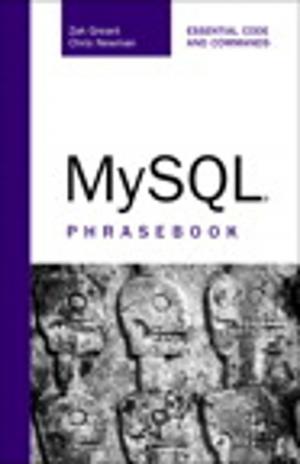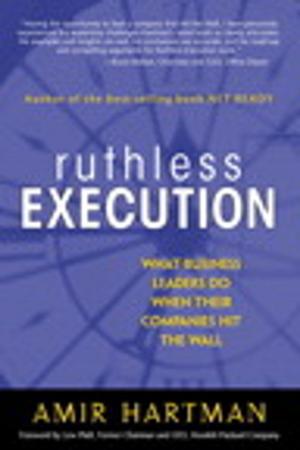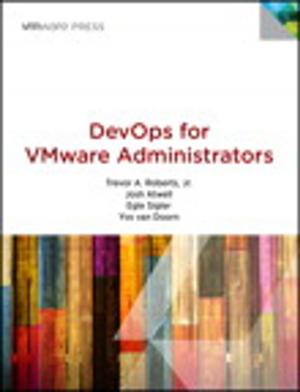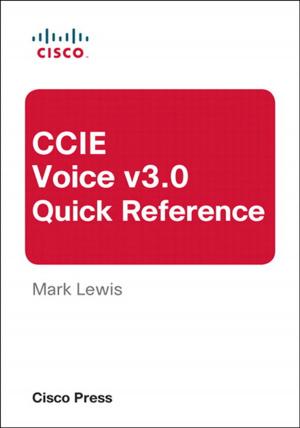| Author: | Adam Stroud | ISBN: | 9780134438108 |
| Publisher: | Pearson Education | Publication: | July 25, 2016 |
| Imprint: | Addison-Wesley Professional | Language: | English |
| Author: | Adam Stroud |
| ISBN: | 9780134438108 |
| Publisher: | Pearson Education |
| Publication: | July 25, 2016 |
| Imprint: | Addison-Wesley Professional |
| Language: | English |
Battle-Tested Strategies for Storing, Managing, and Sharing Android Data
“Android™ Database Best Practices goes well beyond API documentation to offer strategic advice about how to handle data in an Android application and the tools needed to develop productively. This arms the developer with a trove of solutions to nearly any problem an application may face involving data. Mastering the concepts in this book are therefore essential for any developer who wants to create professional Android applications.”
–Greg Milette, Android developer, Gradison Technologies, Inc.
This is the first guide to focus on one of the most critical aspects of Android development: how to efficiently store, retrieve, manage, and share information from your app’s internal database. Through real-world code examples, which you can use in your own apps, you’ll learn how to take full advantage of SQLite and the database-related classes on Android.
A part of Addison-Wesley’s Android™ Deep Dive series for experienced Android developers, Android Database Best Practices draws on Adam Stroud’s extensive experience leading cutting-edge app projects.
Stroud reviews the core database theory and SQL techniques you need to efficiently build, manipulate, and read SQLite databases. He explores SQLite in detail, illuminates Android’s APIs for database interaction, and shares modern best practices for working with databases in the Android environment.
Through a complete case study, you’ll learn how to design your data access layer to simplify all facets of data management and avoid unwanted technical debt. You’ll also find detailed solutions for common challenges in building data-enabled Android apps, including issues associated with threading, remote data access, and showing data to users. Extensive, up-to-date sample code is available for download at github.com/android-database-best-practices/device-database.
You will
- Discover how SQLite database differs from other relational databases
- Use SQL DDL to add structure to a database, and use DML to manipulate data
- Define and work with SQLite data types
- Persist highly structured data for fast, efficient access
- Master Android classes for create, read, update, and delete (CRUD) operations and database queries
- Share data within or between apps via content providers
- Master efficient UI strategies for displaying data, while accounting for threading issues
- Use Android’s Intents API to pass data between activities when starting a new activity or service
- Achieve two-way communication between apps and remote web APIs
- Manage the complexities of app-to-server communication, and avoid common problems
- Use Android’s new Data Binding API to write less code and improve performance
Battle-Tested Strategies for Storing, Managing, and Sharing Android Data
“Android™ Database Best Practices goes well beyond API documentation to offer strategic advice about how to handle data in an Android application and the tools needed to develop productively. This arms the developer with a trove of solutions to nearly any problem an application may face involving data. Mastering the concepts in this book are therefore essential for any developer who wants to create professional Android applications.”
–Greg Milette, Android developer, Gradison Technologies, Inc.
This is the first guide to focus on one of the most critical aspects of Android development: how to efficiently store, retrieve, manage, and share information from your app’s internal database. Through real-world code examples, which you can use in your own apps, you’ll learn how to take full advantage of SQLite and the database-related classes on Android.
A part of Addison-Wesley’s Android™ Deep Dive series for experienced Android developers, Android Database Best Practices draws on Adam Stroud’s extensive experience leading cutting-edge app projects.
Stroud reviews the core database theory and SQL techniques you need to efficiently build, manipulate, and read SQLite databases. He explores SQLite in detail, illuminates Android’s APIs for database interaction, and shares modern best practices for working with databases in the Android environment.
Through a complete case study, you’ll learn how to design your data access layer to simplify all facets of data management and avoid unwanted technical debt. You’ll also find detailed solutions for common challenges in building data-enabled Android apps, including issues associated with threading, remote data access, and showing data to users. Extensive, up-to-date sample code is available for download at github.com/android-database-best-practices/device-database.
You will
- Discover how SQLite database differs from other relational databases
- Use SQL DDL to add structure to a database, and use DML to manipulate data
- Define and work with SQLite data types
- Persist highly structured data for fast, efficient access
- Master Android classes for create, read, update, and delete (CRUD) operations and database queries
- Share data within or between apps via content providers
- Master efficient UI strategies for displaying data, while accounting for threading issues
- Use Android’s Intents API to pass data between activities when starting a new activity or service
- Achieve two-way communication between apps and remote web APIs
- Manage the complexities of app-to-server communication, and avoid common problems
- Use Android’s new Data Binding API to write less code and improve performance















